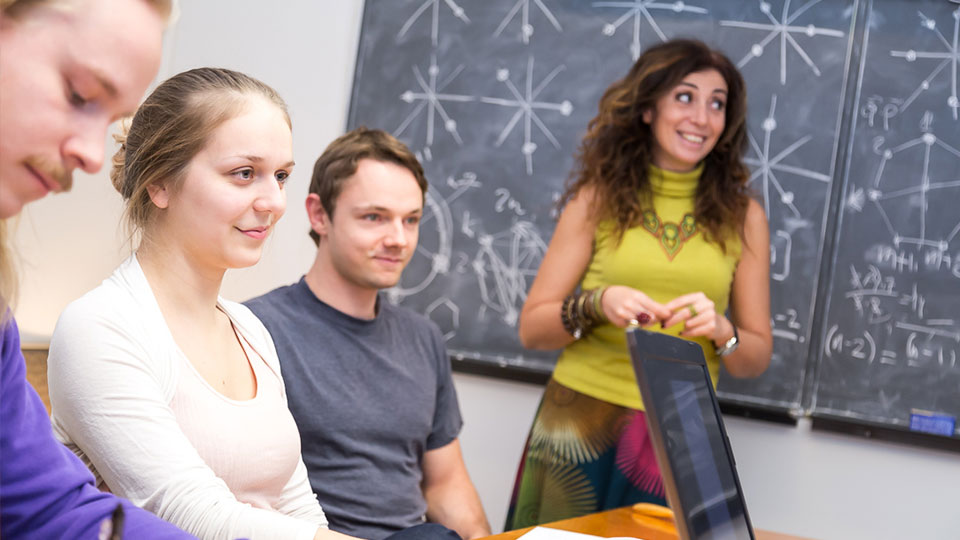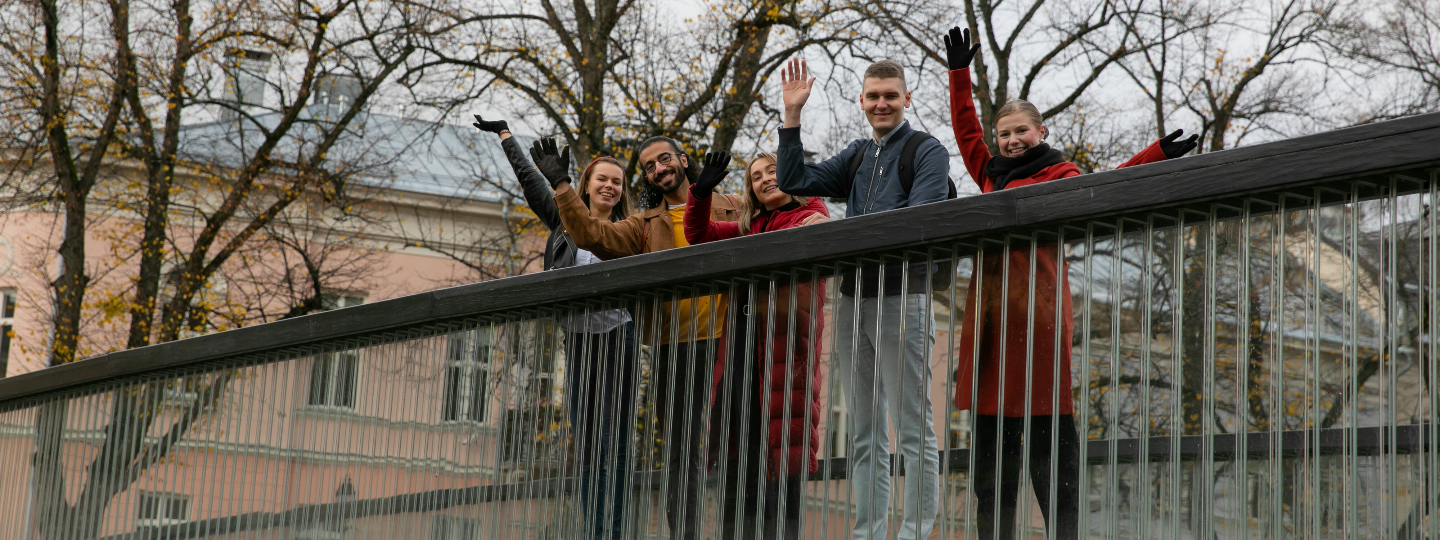Master's Degree Programme in Exact Sciences: Theoretical Physics
The Theoretical Physics track introduces the student to the intriguing diversity of physical theories and gives means to understand the world.
Understanding the laws of nature from the bottom to the top!
Topics from quantum physics to the theories of gravity are incorporated into the track of Theoretical Physics. Problems of mathematical quantum physics, quantum information, open quantum systems, quantum technologies, quantum field theory, and theoretical cosmology are at the heart of the studies in Theoretical Physics.
Upon graduation, you will be able to use the diverse set of skills acquired as part of this track, including theoretical and numerical techniques to produce and analyse new physical projects.
The track of theoretical physics is one of the six specialisation tracks of the Master´s Degree Programme in Exact Sciences (previously called the MDP in Physical and Chemical Sciences). The other tracks of the programme are
- Astronomy and Space Physics
- Chemistry of Drug Development
- Materials Chemistry
- Materials Physics.
- Mathematics and Statistics

Entry requirements
General Requirement
You are an eligible applicant for Master’s-level studies if
- you have a nationally recognized first cycle degree – normally a Bachelor’s degree – from an accredited institution of higher education,
- your degree corresponds to at least 180 ECTS (European credits) or to three years of full-time study,
- your degree is in a relevant field for the Master’s degree programme that you’re applying to. Please check the section on track-specific admission requirements for detailed degree requirements.
Language Requirements
Applicants must have excellent English language skills and a certificate that proves those skills. You can indicate your language skills by taking one of the internationally recognized English language tests.
Applicants must reach the minimum required test results to be considered eligible for the University of Turku. No exceptions will be made. Read more about the language requirements here.
Study right
It is not possible to have more than one Bachelor’s or Master’s study right at the same Faculty. Therefore, when accepting an offered study place, the student will lose any previous BSc. or MSc. study right at the Faculty of Science at the University of Turku.
Before you start preparing your application, always read the full admission requirements on the application portal Studyinfo.fi
The applicant’s previous degree on the basis of which s/he is seeking admission to the Master’s Degree Programme in Physical and Chemical Sciences must be in a relevant field of study. Relevant fields of previous studies for the Theoretical Physics track are
- theoretical physics
- physics
- or similar
You may not apply to more than one specialization track within the same Master’s Degree Programme at the University of Turku. Therefore, you should carefully consider that your educational background is suitable enough for the track that you are applying to.
The decision of admission will be based on
- the relevance of the applicant’s awarded degree(s)
- the amount, relevance, and grades of the courses in the degree(s)
- the language test result (see Language requirements)
- the motivation letter and your answers to the optional questions included in the application
- possible relevant work experience
- possible interview
In addition to the education diploma and language certificate, you should include testimonials of any relevant work experience in your application.
The academic evaluation is made only for complete applications that are received during the application period. Any preliminary assessment of suitability or chances for admission will not be given.
Programme in brief
The structure of the programme is modular and each specialisation track has three obligatory modules that contain the core material of the field. These include the MSc thesis (30 ECTS), lecture and exercise courses, seminars, laboratory work, internship or project work, details of which depend on the specialisation. In addition, there is one thematic module that may be chosen to support your own study plan. The fourth module consists of freely chosen courses and an obligatory Finnish language and culture course (5 ECTS).
In the Theoretical Physics Track there is one obligatory module of general studies in theoretical physics, one obligatory module of more specialized studies in theoretical physics and one obligatory module containing the Master’s Thesis (30 ECTS) and special courses like seminar, internship, and project in research.
In the Theoretical physics module 1, you will learn the basic theories of physics by attending lectures and doing exercises in courses on quantum physics, statistical physics, and quantum field theory. In the Theoretical physics module 2, you deepen your understanding and develop your skills in more specified topics of theoretical physics, such as fundamentals of quantum physics, quantum information, and optics, quantum field theory, and cosmology.
The Thematic module consists of courses offered by the department, mathematics, etc. according to your will agreed with theoretical physics subject. Courses in relevant topics of mathematics, physics, and astronomy are recommended. These studies can be used to form a minor. Possible minors are e.g. mathematics, physics, astronomy, and computer science.
In the Other studies module, you can choose any courses you want from the entire offering of the university in addition to the obligatory “Finnish for foreigners” course
The aim of the Master’s education is to support you to become an independent expert who can evaluate information critically, plan and execute research projects to find new knowledge, and solve scientific and technological problems independently and as a part of a group.
At the University of Turku, the research in Theoretical physics has the emphasis on various fields at the forefront of European and international research such as quantum technologies, fundamentals of quantum physics, quantum information and optics, quantum field theory, and cosmology. You will learn rigorous mathematical and numerical methods to model physical phenomena and solve physical problems with several possible interdisciplinary applications also outside physics. Examples are the studies of complex systems, data science, and machine learning.
The Master’s degree programme includes a compulsory thesis component (30 ECTS), which corresponds to six months of full-time work. The thesis is to be written up as a report based on a combination of a literature review and an original research project that forms the bulk of the thesis.
The thesis is an independently made research project but the project will be carried out under the guidance of leading researchers in the field at the University of Turku. It is expected that the student will be embedded within an active research group or experimental team, thereby providing ample opportunity to discuss results and exchange ideas in a group setting.
The large variety of recent thesis titles in theoretical physics includes
- Decoherence and dissipation of a quantum Brownian particle
- Non-Markovian dynamics of the spin-boson model
- Quantum Zeno- anti-Zeno transition for a dynamically decoupled system
- Superconductivity and superfluids
- Quantum field theory and particle production on curved space-time
- Time-loop formalism and the thermalisation of the neutrinos in the early universe
- The Boltzmann equations in cosmology
- Automorphisms and coexistence of quantum effects
- A search algorithm for symmetric, informationally complete sets of positive operators
- Ontological models and contextuality
The Master’s Degree Programme in Exact Sciences has six tracks. A short description of this specialisation track is given below. You can find more detailed information on tracks from the specific site of each track by clicking on the links below.
In Theoretical physics, you can specialise in various fields at the forefront of European and international research such as quantum technologies, fundamentals of quantum physics, quantum information and optics, quantum field theory, and cosmology. You will learn rigorous mathematical and numerical methods to model physical phenomena and solve physical problems with several possible interdisciplinary applications also outside physics. Examples are the studies of complex systems, data science, and machine learning.
Other tracks:
Astronomy and Space, Chemistry of Drug Development, Mathematics and Statistics, Materials Chemistry and Materials Physics
Career options
The Master of Science degree provides the skills to work in many different kinds of positions within areas such as research and development, education and management, and industry. In particular, MSc in theoretical physics offers a deep understanding of the physical world, its structure and functioning as well as practical abilities to work with various other topics.
MSc in theoretical physics prepares the student for an academic career but it also gives excellent skills in using mathematical tools, physical models, and computational techniques. These provide the ability to work in various positions from the finance sector to data science and machine learning.
Moreover, they form the students to new jobs in the emerging quantum technology industries. So, the MSc in theoretical physics prepares you either for a career in research and development in industry or for a follow-up Ph.D. study.
The prospects for employment at relatively senior levels are excellent for those trained in the physical and chemical sciences. Thanks to the broad scope of the programme, the skills, and knowledge developed as part of this education at the University of Turku provide many employment opportunities in different areas.
Our MSc graduates have been employed in a wide range of professions, in addition to an academic career, such as:
- finance sector,
- medical imaging,
- quantum technology,
- game development, and
- data mining.
The Master’s Degree provides eligibility for scientific postgraduate degree studies. Postgraduate degrees are doctoral and licentiate degrees. The University of Turku Graduate School – UTUGS has a Doctoral Programme in Exact Sciences, and covers all of the disciplines of this Master's Degree programme. Postgraduate degrees can be completed at the University of Turku.
Note that in Finland doctoral studies incur no tuition fees, and Ph.D. students often receive either a salary or a grant to cover their living expenses. The Master’s programme is a stepping stone for Ph.D. studies.
Podcast: Colours of UniTurku | Warm Purple: Delta
Colours of UniTurku introduces Delta, the student association of mathematics and physical science of the University of Turku. #utuambassador Parisa Piran and a board member of Delta, Aleksi Varho, talk about Delta’s activities and gatherings. Aleksi shares his motives for joining Delta and his best experiences!

